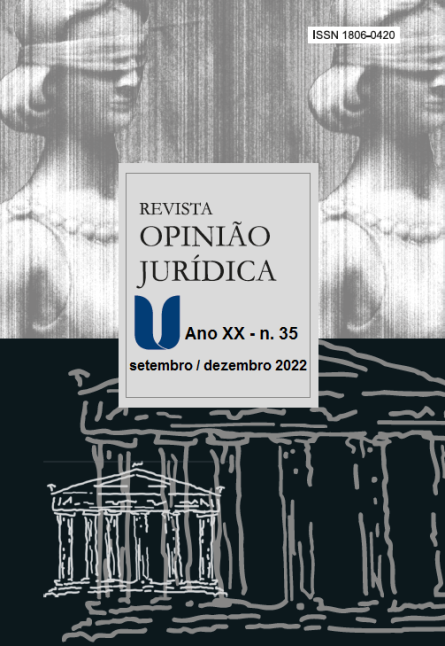CORNERSTONES OF ENVIRONMENTAL LAW, ECOCIDE AND THE FUNDAMENTAL RIGHT TO THE ENVIRONMENT FOR THE DEVELOPMENT OF THE INDIVIDUAL
DOI:
https://doi.org/10.12662/2447-6641oj.v20i35.p83-109.2022Keywords:
environmental law, ecologic crime, ecocide, antinomy, fundamental rights, rights dynamogeniesAbstract
Objective: The consecration of the environment as a protected legal right worthy of protection, both by national and international legal systems, has brought as a consequence the need to specify terminologically the concept of environment. In this sense, as a consequence of its novelty, the implementation of the concept has been the object of multiple opposing positions on its definition, which, on occasions, has meant a real burden that has led to a lack of protection of this right. Fortunately, the anthropocentric vision has been disappearing in function of the ecocentric position that emphasizes the protection of the environment at the same time that it is independent of its link with other rights such as human life or patrimony, as proclaimed in our fundamental text (the Spanish Constitution of 1978). Finally, it is proposed, after an in-depth study of the constitutional precept, the typification of ecocide as a new crime in the international framework that guarantees the conservation and preservation of the environment with the aim of promoting sustainable development that guarantees both progress and the conservation of our planet.
Methodology: On the one hand, we have used a historical-logical method that allows us to focus on the object of study in an evolutionary process that makes it possible to understand its historical behavior and explains its current physiognomy. At the same time, we use the method of analysis-synthesis that makes it possible to break down the object under study into its elements and then recompose it from the integration of these elements.
Results: The results obtained in this research have been decisive in delimiting the concept of environment from the legal point of view, which is obviously the first step to take in order to configure a normative body that defends it. At the same time, it has been proposed that ecocide should be considered an international crime, which would help to preserve the ecosystem and promote sustainable development.
Downloads
Published
How to Cite
Issue
Section
License
CESSION OF COPYRIGHTS
The submission of articles to analysis for publication on Opinião Jurídica implies the author(s) transfers copyrights to Centro Universitário Christus – UNICHRISTUS for reproduction, publicizing, distribution, printing and publication, according to the Publication Norm 414R, Opin. Jur., Fortaleza, year 12, n. 16, p.1-414, Jan./Dec. 2014, costs to be bore by UNICHRISTUS, in whatever format or means that may or shall exist, in accordance to articles 49 and following of Federal Law 9.610/98.
1. In ceding copyrights, the author(s) agrees to do so in exclusivity, free of charge and for the totality of the work.
2. UNICHRISTUS may make the work, in its entirety or in parts, available for scholarly purposes, without altering its contents, except for small corrections that are deemed necessary.
3. The cession of copyrights is valid in all countries and for versions of the material in its original language or translated into a foreign language.
RESPONSIBILITY FOR THE CONTENT
By submitting an article, the author(s) declare to have sole responsibility for the content of the piece and is(are), therefore, responsible for any judicial or extrajudicial measures referring to it.
1. In case of joint authorship, all authors are considered collectively responsible, except when proved otherwise.


















